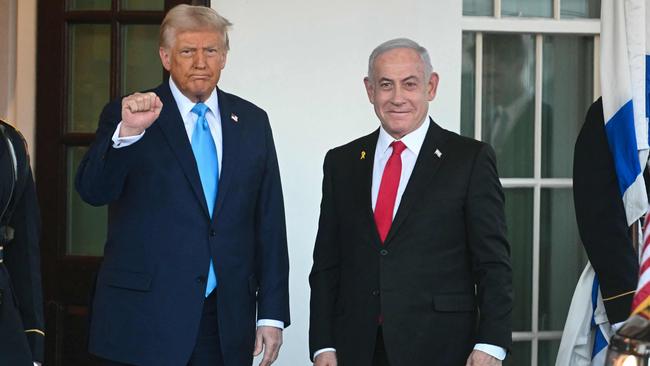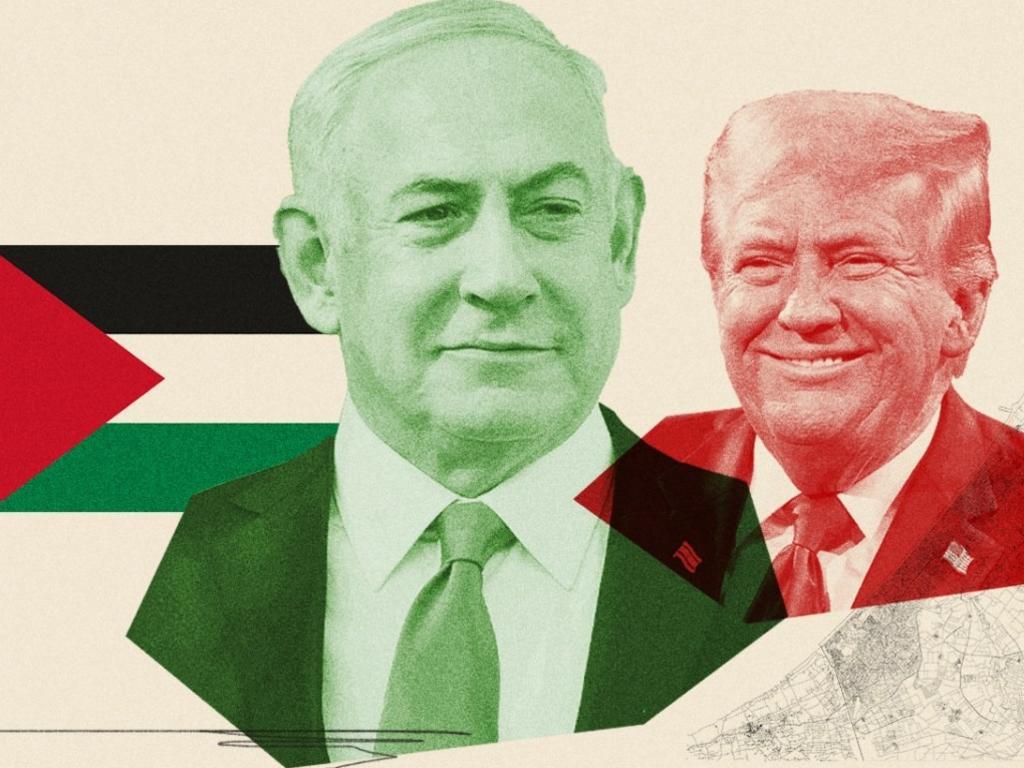‘The US will take over, level Gaza’: Trump makes bombshell claims after talks with Netanyahu
In a press conference with Benjamin Netanyahu, Donald Trump says the US will ‘own’ the Gaza Strip ‘long term’ and redevelop it into a booming jobs hub: The Israeli PM says it will ‘change history’.
Donald Trump says that America will take over the Gaza Strip and redevelop it into a booming Middle East jobs hub – suggesting the territory could become the “Riviera of the Middle East” – but warned the Palestinian people would need to be “relocated to other countries” for the plan to work.
Unveiling the radical blueprint alongside Israeli Prime Minister Benjamin Netanyahu at the White House amid a fragile ceasefire agreement between the Jewish homeland and Hamas following 16 months of hostilities, Mr Trump said he was prepared to use US troops to realise his vision – if it proved necessary.
He said there was a need to “do something different” in order to break the cycle of violence and deliver peace in the Middle East, arguing that the “world’s people” could live in the small territory overlooking the Mediterranean once the project was completed.
The audacious plan – hailed as “history changing” by Mr Netanyahu – immediately raised questions from journalists over the future of the two state solution, what legal authority there was for the proposal, where the Palestinian people could be relocated and the extent of support from other Arab nations – including Egypt, Jordan and Saudi Arabia – for the blueprint.
Mr Trump said Gaza “should not go through a process of rebuilding and occupation by the same people that have really stood there and fought for it and lived there and died there and lived a miserable existence there.”
“Instead we should go to other countries of interest with humanitarian hearts – and there are many of them that want to do this – and build various domains that will ultimately be occupied by the 1.8 million Palestinians living in Gaza, ending the death of destruction and frankly bad luck.”
Mr Trump said the policy could be paid for by “neighbouring countries of great wealth” and that Palestinians could be relocated to other numerous sites – or simply one large site. But he stressed that “people would be able to live in comfort and peace and we’ll make sure that something really spectacular is done.”
“They are going to have peace,” he said. “They are not going to be shot at and killed or destroyed.”
Mr Trump signalled his intention to send US troops “if it’s necessary” to take control of the Gaza Strip, and clarified that he saw a “long term ownership position” for America over the territory.
“We’ll do what is necessary. If it’s necessary, we’ll do that,” he said. “We’re going to take over that piece (of land). And we’re going to develop it, create thousands and thousands of jobs, and it’ll be something that the entire Middle East can be very proud of.”
He added: “Everybody I’ve spoken to loves the idea of the United States owning that piece of land, developing and creating thousands of jobs with something that will be magnificent.
“I’ve studied this very closely over a lot of months. And I’ve seen it from every different angle. And it’s a very, very dangerous place to be. And it’s only going to get worse.”
He appealed for Jordan and Egypt to help provide a home for the Palestinian people currently living in Gaza, saying that: “I have a feeling that the King in Jordan (Abdullah II) and that the … President, the General in Egypt (Abdel Fattah el-Sisi) will open their hearts and will give us the kind of land that we need to get this done.”
Mr Trump has invited Jordan’s King Abdullah and Mr el-Sisi to the White House for talks later this month.
He also suggested that Saudi Arabia was “going to be very helpful, and they have been very helpful. They want peace in the Middle East. It’s very simple.”

Speaking alongside Mr Netanyahu – the first foreign leader to be invited to White House since the January 20 inauguration – Mr Trump said America would be responsible for “dismantling all of the dangerous unexploded bombs and other weapons on the site, level the site, and get rid of the destroyed buildings, level it out, create an economic development that will supply unlimited numbers of jobs and housing for the people of the area.”
However he suggested he didn’t support Israel rebuilding Jewish settlements in Gaza. “I don’t see it happening. It’s too dangerous for people. No one wants to be there. Their warriors don’t want to be there. Their soldiers don’t want to be there,” he said.
Mr Netanyahu, asked whether Israel would accept the US taking over land that has such historical importance for them, said it would “change history,” and was “worth pursuing.”
The Israeli PM described the US President as the “greatest friend Israel has ever had in the White House” and argued that “this is the kind of thinking that will reshape the Middle East and bring peace.”
“Israel has never been stronger, and the Iran terror axis has never been weaker,” Mr Netanyahu said. “I believe, Mr President, that your willingness to puncture conventional thinking, thinking that has failed time and time and time again, your willingness to think outside the box with fresh ideas, will help us achieve all these goals.”
“You see things others refuse to see. You say things others refuse to say,” Mr Netanyahu said. “And after the jaws drop, people scratch their heads and say, ‘you know, he’s right.’ And this is the kind of thinking that enabled us to bring the Abraham Accords.”
Mr Netanyahu made clear the plan presented by Mr Trump aligned with his three objectives to “destroy Hamas military and governing capabilities, secure the release of all of our hostages and ensure that Gaza never again poses a threat to Israel.”
Any attempt by the US to take over Gaza would be a violation of international law and the removal of Palestinians from the territory a “crime against humanity”, ANU Professor Don Rothwell says.
Speaking hours after Donald Trump made his bombshell statement, Professor Rothwell said Gaza was recognised by the International Court of Justice as being part of the Occupied Palestinian Territories, and Israel the occupying power.
“The US has no territorial rights in Gaza and is not a party to the conflict between Hamas and Israel. It therefore follows that the US has no legal right to control Palestinians in Gaza,” the prominent international law expert said.
“Any effort by the US in collaboration with Israel to remove Palestinians from Gaza could be seen as an effort to annex Gaza, even if US ‘control’ is de facto and not de jure (according to law).
“The forced removal of Palestinians from Gaza in the context of the Hamas/Israel conflict would be a crime against humanity.”
He added the forced removal of children from Gaza could “could possibly constitute an act of genocide under the Genoide Convention”.
“As such, any such conduct could result in fresh Genocide Convention proceedings being commenced in the International Court of Justice seeking provisional measures against Israel and the US.
“The US proposal would be condemned by the UN General Assembly
“The US proposal would probably face censure in the UN Security Council, where the US veto would protect it from sanction.”
Saudi normalisation
Mr Netanyahu and Mr Trump also both expressed optimism over a potential peace deal between Israel and Saudi Arabia, with Mr Netanyahu saying:“I think peace between Israel and Saudi Arabia is not only feasible, I think it’s going to happen.”
Mr Trump agreed, saying Saudi hadn’t made any demands for a Palestinian state in exchange for advancing normalisation talks with Israel.
However Saudi denied the claims, with the foreign ministry saying in a statement it would not normalise relations with Israel without the establishment of an independent Palestinian state.
‘Maximum pressure’
Mr Trump also signed an order to reimpose “maximum pressure” on Iran, a first step toward toughening enforcement of sanctions on Iranian oil exports and other parts of its economy imposed during his first term.
The president said he was “torn” about signing the memorandum, adding: “Everybody wants me to sign it.”
But he told reporters he would enforce “aggressive action” against Iran, adding the US would “drive Iran’s oil experts to zero.”





To join the conversation, please log in. Don't have an account? Register
Join the conversation, you are commenting as Logout